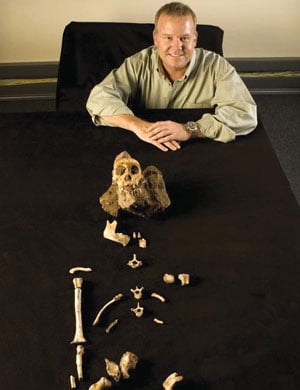
Professor Lee Berger – the American palaeoanthropologist at Wits University who announced the discovery of a new hominid species to the world last week – is facing criticism over the discovery.
Many of his international colleagues think Berger – sometimes described as the “pop star” of palaeontology – was too hasty in concluding that Homo naledi was a new species. Others are also sceptical about the claim that these hominids deliberately buried their dead – a ritual the scientists believe is limited to modern humans.
It has also been revealed that the scientific article in which Berger and his team describe their discovery and conclusions was rejected by Nature, one of the world’s leading scientific journals.
Professor Tim White, a lecturer in palaeoanthropology at the University of Berkeley, California, told The Times of London that the fact that Nature rejected the article was a clear indication that the article and its conclusions did not convince the journal’s selection panel. Berger and his team eventually published their findings online in eLife.
White believes Homo naledi is not a new species but belongs to Homo erectus, an ancestor discovered more than a hundred years ago and whose fossils have been found in a cave near the Homo naledi find.
White believes Berger is guilty of “artificial species inflation”, in which palaeoanthropologists describe each new discovery as a new species.
This is not the first time Berger has been accused of this. Some of his colleagues believe his previous discovery in 2008 – Australopithecus sediba – was nothing other than the already familiar hominid Australopithecus africanus.
The Wits team’s inability to date its new discovery correctly is cause for serious criticism. Rick Potts of the Smithsonian’s Natural History Museum says that without an understanding of its age, “there is no way in which one can judge the evolutionary significance of the discovery”.
The team says it has so far been impossible to date the find because it was buried in sediment, not in volcanic ash or stone – both of which are the usual way fossils are dated. But geologists believe the cave is less than 3 million years old.
There has also, however, been support for Berger. Primatologist Frans de Waal said in The New York Times there was enough evidence that apes, such as chimpanzees, mourned their dead. He said it was quite possible that Homo naledi – despite relatively small brains – hid their dead to prevent scavengers from finding them.
But local naturalist Dave Pepler also questions that the species buried its dead, saying the appearance of the bones of several individual hominids in one place in the cave could be for reasons other than a deliberate burial ritual.
At the time of going to press, Berger had not yet responded to a list of questions sent to him at his request. – Rapport




 Publications
Publications
 Partners
Partners








